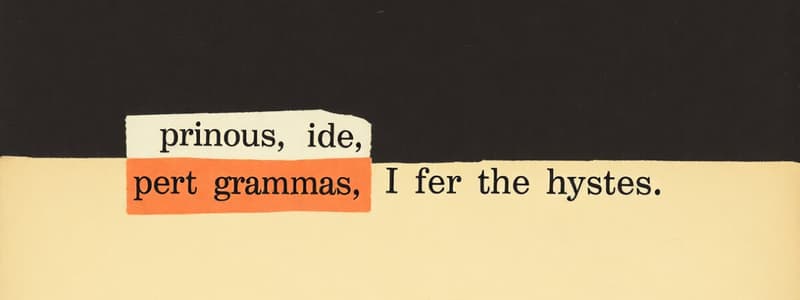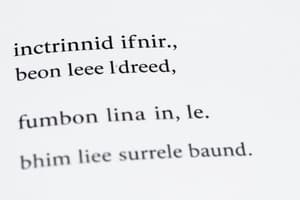Podcast
Questions and Answers
What are indefinite pronouns used for?
What are indefinite pronouns used for?
- To indicate possession
- To refer to a specific noun
- To specify quantity
- To refer to an indefinite noun (correct)
Which of the following is an example of a distributive pronoun?
Which of the following is an example of a distributive pronoun?
- Each (correct)
- All
- Many
- Some
What is the use of reciprocal pronouns?
What is the use of reciprocal pronouns?
- For showing ownership
- For indicating comparison
- For mutual relationships (correct)
- For expressing indifference
According to Rule 1, what must a pronoun agree with?
According to Rule 1, what must a pronoun agree with?
In the context of Rule 2, if 'each' is used with two singular nouns, what will the verb be?
In the context of Rule 2, if 'each' is used with two singular nouns, what will the verb be?
What does Rule 3 state about using singular pronouns with 'or'?
What does Rule 3 state about using singular pronouns with 'or'?
What does Rule 4 require when mixing singular and plural subjects?
What does Rule 4 require when mixing singular and plural subjects?
According to Rule 5, how should pronouns be ordered in a sentence?
According to Rule 5, how should pronouns be ordered in a sentence?
What is the implication of Rule 6 in sentences with '1' involved?
What is the implication of Rule 6 in sentences with '1' involved?
Which of the following pronouns is NOT an example of an indefinite pronoun?
Which of the following pronouns is NOT an example of an indefinite pronoun?
What do we call words that are used in place of nouns?
What do we call words that are used in place of nouns?
Which of the following is an example of a reflexive pronoun?
Which of the following is an example of a reflexive pronoun?
Which type of pronoun is used to ask questions?
Which type of pronoun is used to ask questions?
Identify the personal pronouns from the following options.
Identify the personal pronouns from the following options.
Which of the following describes a reflexive pronoun used for emphasis?
Which of the following describes a reflexive pronoun used for emphasis?
What is the function of relative pronouns?
What is the function of relative pronouns?
Which of the following is classified as a demonstrative pronoun?
Which of the following is classified as a demonstrative pronoun?
Which personal pronoun is used for the first person plural?
Which personal pronoun is used for the first person plural?
Which of the following interrogative pronouns is used to inquire about possession?
Which of the following interrogative pronouns is used to inquire about possession?
The pronoun 'they' is an example of which type of pronoun?
The pronoun 'they' is an example of which type of pronoun?
Which pronoun should be used when three persons are mentioned together in a sentence?
Which pronoun should be used when three persons are mentioned together in a sentence?
What is the correct form when a pronoun is the complement of a 'to be' verb?
What is the correct form when a pronoun is the complement of a 'to be' verb?
Which phrase correctly describes two persons compared with more than two persons?
Which phrase correctly describes two persons compared with more than two persons?
How should the verb be conjugated when the relative pronoun is the subject?
How should the verb be conjugated when the relative pronoun is the subject?
In which case is 'who' generally used?
In which case is 'who' generally used?
When should 'whom' be used in a sentence?
When should 'whom' be used in a sentence?
What is the purpose of 'which' in a sentence?
What is the purpose of 'which' in a sentence?
Which sentence is correctly formed?
Which sentence is correctly formed?
What is the correct usage of 'that' in sentences?
What is the correct usage of 'that' in sentences?
What is the corrected form for 'The book whom we like most is out of print'?
What is the corrected form for 'The book whom we like most is out of print'?
What should follow 'same' or 'such' in a sentence?
What should follow 'same' or 'such' in a sentence?
Which sentence uses 'whose' correctly?
Which sentence uses 'whose' correctly?
Which sentence is correctly expressed regarding the use of pronouns?
Which sentence is correctly expressed regarding the use of pronouns?
Which option correctly corrects the sentence 'He can run faster than me'?
Which option correctly corrects the sentence 'He can run faster than me'?
Which correction is appropriate for the sentence 'Neither of the two friends are faithful.'?
Which correction is appropriate for the sentence 'Neither of the two friends are faithful.'?
Which sentence correctly uses the reflexive pronoun?
Which sentence correctly uses the reflexive pronoun?
Which sentence uses the correct form of 'one' in reference to health?
Which sentence uses the correct form of 'one' in reference to health?
Which correction is appropriate for the sentence 'It is me who did it.'?
Which correction is appropriate for the sentence 'It is me who did it.'?
What is the Attributive use of an adjective?
What is the Attributive use of an adjective?
In which scenario do you use 'to' instead of 'than'?
In which scenario do you use 'to' instead of 'than'?
Which of the following is an example of Predicative use of an adjective?
Which of the following is an example of Predicative use of an adjective?
Which of the following adjectives shows the highest degree and does not have comparative or superlative forms?
Which of the following adjectives shows the highest degree and does not have comparative or superlative forms?
What is the correct usage of 'wiser' in a comparison?
What is the correct usage of 'wiser' in a comparison?
Where should an adjective be placed when used as a title?
Where should an adjective be placed when used as a title?
Which combination correctly uses the superlative form?
Which combination correctly uses the superlative form?
Which adjective functions in a positive degree as opposed to comparative?
Which adjective functions in a positive degree as opposed to comparative?
What is the incorrect form related to the adjective 'complete'?
What is the incorrect form related to the adjective 'complete'?
In phrases, where are adjectives typically placed?
In phrases, where are adjectives typically placed?
Study Notes
Pronoun
- A word used in place of a noun is called a pronoun.
- Pronouns are categorized by their function and usage.
Personal Pronouns
- They represent the speaker, person being spoken to, and the person or thing being spoken about.
- First person: refers to the person speaking: I, we, me, us, mine, our, ours.
- Second person: refers to the person being spoken to: you, your, yours, thou, thee, thine.
- Third person: refers to the person or thing being spoken about: he, she, it, its, him, they, them, her, hers, his, their, theirs.
Relative Pronouns
- They connect two sentences and relate to a previously mentioned noun.
- Examples: who, whom, whose, which, what, as, that
- Example: I know the boy who came here.
Interrogative Pronouns
- They are used to form questions.
- Examples: who, whose, whom, which, what
- Example: Who are you?
Demonstrative Pronouns
- They indicate a noun or pronoun.
- Examples: this, that, these, those
- Example: This is my pen.
Reflexive Pronouns
- Formed by adding self or selves to a personal pronoun.
- Used when the subject and object of the verb are the same person.
- Example: I hurt myself.
Indefinite Pronouns
- Used to refer to unspecified nouns or quantities
- Examples: all, much, little, one, some, none, few, many, any
- Example: One must love one's country.
Distributive Pronouns
- Used to refer to each individual in a group.
- Examples: each, either, neither
- Example: Each of the girls got a reward.
Reciprocal Pronouns
- Used to express mutual relationship.
- Example: Arun and Varun help each other.
Rules Relating to Pronouns
-
A pronoun's person, number, and gender should match its antecedent.
-
When each or every precedes two singular nouns connected by and, the verb and pronoun are singular.
-
With two or more singular nouns joined by or, either...or, or neither....nor, the pronoun is singular.
-
When a singular and plural subject are connected by or, either...or, or neither.....nor, the pronoun agrees with the nearer noun.
-
When using pronouns for three persons in one sentence, use the order II, III, I (231).
-
This is a book for you and me.
-
Use the first-person plural pronoun (we) if the first person is included along with other persons.
-
When "to be" verb has a pronoun as the complement, it's always in Nominative Case.
-
Each other for two persons and one another for more than two
-
The verb after a relative pronoun agrees with its antecedent in number and person.
-
Who is generally for people, whom for people, whose for people, but sometimes for things
-
Which for things and animals
-
That can be used for people and things
-
When same or such precedes the antecedent, the relative pronoun is usually as.
Adjectives
- Usually placed before the word they modify but can be used predicatively after the verb
- Titles are placed after the noun
- Phrases have the adjective following the noun.
- Superior, junior, inferior, prior, senior are used as comparatives and use to instead of than.
- Interior, exterior, major, minor, former, latter, upper, inner, outer are used in the positive degree.
- Some adjectives (round, perfect, unique, chief, complete, etc.) are used in the highest degree and don't have comparative or superlative forms.
- Two individuals or things are compared using the Comparative Degree.
Studying That Suits You
Use AI to generate personalized quizzes and flashcards to suit your learning preferences.
Related Documents
Description
This quiz covers the various types of pronouns in English, including personal, relative, interrogative, and demonstrative pronouns. Test your knowledge on their definitions, uses, and examples to enhance your understanding of English grammar.




